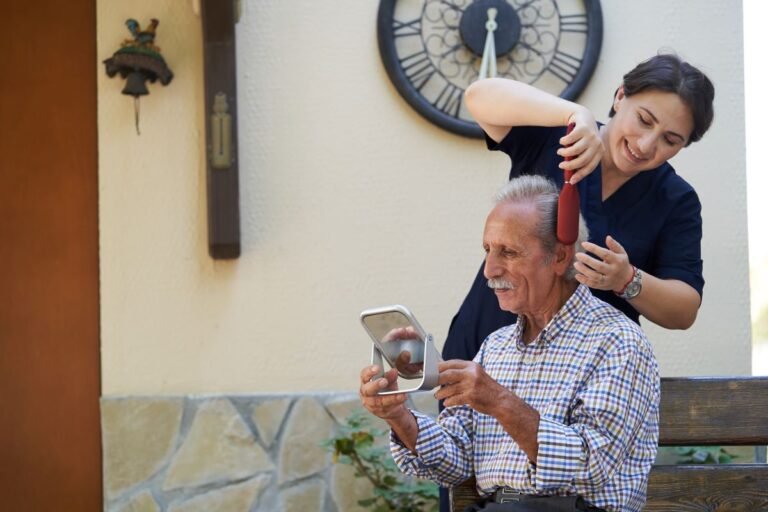Getting ready for a caregiver interview is crucial for finding success in your job search. While there isn’t a set list of questions you’ll definitely be asked during the interview, it’s vital to grasp what employers are looking for in caregivers.
In this detailed guide, we’ve put together 20 example caregiver interview questions along with fitting responses. By carefully reviewing the caregiver job description, practicing these questions, and reflecting on your accomplishments, you’ll be well-equipped to highlight your qualifications and shine in your caregiver interview.
Whether you’re a seasoned caregiver or just starting out in this field, these interview questions will provide valuable insights into different aspects of the role. They’ll help you showcase your expertise and commitment to delivering outstanding care.
So, let’s go into these caregiver interview questions and answers to ensure you’re well-prepared for your upcoming interview!

Table of contents
- Common Interview Questions and Answers for Caregiver Position
- #1. Tell me a little bit about yourself. OR Introduce yourself.
- #2. Why are you interested in this job? OR Why do you want to work as a caregiver?
- #3. Why do you want to work for us?
- #4. What, according to you, are the primary responsibilities of a caregiver?
- #5. Are there any other important tasks to be performed by a caregiver?
- #6. Why did you decide to pursue a career as a caregiver?
- #7. What would you say is an area you’re actively working on to improve?
- #8. What steps are you taking to overcome this challenge?
- #9. What do you consider to be your standout quality?
- #10. Can you share a particularly proud moment in your caregiving journey?
- ##11. What is your experience as a caregiver with children?
- #12. Speaking of special needs, what is your specific experience with children who need specialized care?
- #13. What is your caregiving experience with geriatric patients?
- #14. How do you handle patients with dementia? Do you have a unique plan?
- #15. Have you ever come across a situation where a patient with dementia tested your patience?
- #16. What are the skills necessary to perform a caregiver job?
- #17. Do you believe that caregivers need medical training?
- #19. What is your experience in administering medication?
- #20. How do you make things better for the people you are providing care to?
- 4 Tips for Passing a Caregiver Job Interview!
- FAQs
- Conclusion
- References
- Recommendations
Common Interview Questions and Answers for Caregiver Position
#1. Tell me a little bit about yourself. OR Introduce yourself.
Certainly! I appreciate the chance to share a bit about myself. I’m [Your Name], a devoted caregiver with a sincere passion for helping others.
Over the past [Number of years] years, I’ve worked in caregiving, assisting people of various ages and backgrounds. My approach centers on treating everyone with dignity, respect, and kindness while ensuring their safety and well-being.
Making a positive impact on those I assist and fostering a warm environment brings me immense joy.
#2. Why are you interested in this job? OR Why do you want to work as a caregiver?
I’m genuinely passionate about caregiving because it allows me to make a positive impact in people’s lives. Providing assistance, support, and companionship to those in need is fulfilling.
Building meaningful relationships and witnessing progress and happiness in individuals I care for is truly rewarding. Being a caregiver enables me to utilize my natural caregiving skills and compassion to make a meaningful difference in the lives of others.
#3. Why do you want to work for us?
I’m keen on joining your organization due to its stellar reputation in caregiving and its alignment with my values. Your commitment to personalized care, nurturing environments, and the well-being of clients and caregivers resonates with me.
I believe I can contribute to the positive work culture and grow both personally and professionally within your organization, making a meaningful impact on those we serve.
#4. What, according to you, are the primary responsibilities of a caregiver?
In my view, a caregiver’s main responsibilities include offering dedicated support, assisting with daily activities, prioritizing safety and well-being, maintaining effective communication, and approaching the role with empathy and patience. It’s about enhancing the overall quality of life for those under care.
#5. Are there any other important tasks to be performed by a caregiver?
Beyond primary responsibilities, caregivers often engage in tasks like providing emotional support, assisting with housekeeping, accompanying individuals to appointments or activities, and ensuring a clean and organized environment.
See also: What to bring to a job interview | Top 5 MUST-HAVE things
#6. Why did you decide to pursue a career as a caregiver?
Choosing to work as a caregiver was a natural decision for me because I genuinely love assisting others and making a positive impact on their lives. The fulfillment I get from providing care and support to those in need is immeasurable.
Contributing to their well-being, ensuring their comfort, and enhancing their overall quality of life brings me great joy.
#7. What would you say is an area you’re actively working on to improve?
In my role as a caregiver, I am always striving to enhance my skills and personal development. While I wouldn’t describe it as a weakness, an ongoing focus for me is refining my ability to manage my workload effectively.
Due to my unwavering dedication to offering the best care possible, I sometimes find it challenging to set clear boundaries and prioritize self-care.
#8. What steps are you taking to overcome this challenge?
I’m proactively implementing strategies to better handle my time and establish a healthy work-life balance.
Seeking support from colleagues, incorporating self-care practices into my routine, and remaining mindful of my own well-being are crucial components of my approach.
Acknowledging this area for improvement reflects my commitment to evolving into an even more efficient caregiver.
#9. What do you consider to be your standout quality?
A significant strength of mine as a caregiver lies in my ability to forge authentic connections and cultivate strong relationships with those under my care. I firmly believe that trust and rapport are fundamental in delivering outstanding care.
Through active listening, empathy, and treating each person with the utmost respect, I create an environment that is both comfortable and nurturing. This enables me to better understand their needs, preferences, and concerns, allowing me to tailor my care accordingly.
#10. Can you share a particularly proud moment in your caregiving journey?
One of the moments I take immense pride in as a caregiver is witnessing the transformation in a client’s life through my dedicated care and support. I had the privilege of working with an older adult who initially felt isolated and despondent due to limited mobility and a loss of independence.
Through consistent companionship, encouragement, and engaging activities, I was able to significantly enhance her emotional well-being and overall quality of life. This experience reinforces my commitment to making a positive impact on the lives of those I care for.
See also: 20 Frequently Asked Call Center Agent Interview Questions in Nigeria
##11. What is your experience as a caregiver with children?
I bring a wealth of experience to my role as a caregiver, having worked with children across various age groups, from infants to school-aged youngsters. Each age comes with its distinct needs and developmental stages, and I have honed my skills in creating a safe, nurturing, and stimulating environment tailored to the unique requirements of each child.
My responsibilities encompass a range of tasks, including meal preparation, assistance with hygiene routines, implementation of age-appropriate activities, and fostering a warm and supportive atmosphere.
Moreover, I have achieved notable success in providing care for children dealing with conditions like ADHD and Autism.
#12. Speaking of special needs, what is your specific experience with children who need specialized care?
My specialization extends to working with children with specific needs, particularly those on the autism spectrum. In this capacity, I focus on bolstering communication, social skills, and sensory integration. I apply strategies such as visual schedules, sensory tools, and behavior management techniques to establish a structured and supportive environment.
Additionally, I have hands-on experience assisting children with physical disabilities, addressing mobility aids, positioning, and activities promoting independence and strength. For children with intellectual disabilities, I implement adapted activities and personalized support to enrich their cognitive and social development.
#13. What is your caregiving experience with geriatric patients?
My caregiving journey encompasses significant experience in working with geriatric patients. I comprehend the distinct challenges and particular needs associated with caring for older adults.
In previous roles, I’ve assisted with daily living activities, including bathing, dressing, and medication management. Proficient in the use of mobility aids and techniques for safe transfers and ambulation, I am also skilled in monitoring vital signs and recognizing signs of discomfort or changes in health conditions.
#14. How do you handle patients with dementia? Do you have a unique plan?
My approach to patients with dementia is grounded in empathy, patience, and person-centered care. I tailor my communication style to suit their individual needs, maintain a calm environment, and encourage engagement in meaningful activities to support their well-being and enhance their quality of life.
#15. Have you ever come across a situation where a patient with dementia tested your patience?
Certainly, I have faced situations where patients with dementia tested my patience. Dementia can manifest in challenging behaviors like confusion, agitation, or resistance to care.
In response, I prioritize maintaining a calm and understanding demeanor, focusing on empathy and redirection. Taking deep breaths and seeking support from colleagues or supervisors helps me manage my own emotions and deliver optimal care to the patient.
See also: 20 Frequently Asked Security Guard Interview Questions
#16. What are the skills necessary to perform a caregiver job?
Effectively performing a caregiver job demands a diverse set of crucial skills, including:
- Compassion and Empathy
- Communication Skills
- Patience and Adaptability
- Problem-Solving and Decision-Making
- Personal Care and Assistance
- Observation and Documentation
- Respect for Privacy and Dignity
- Knowledge of Basic First Aid and Safety.
#17. Do you believe that caregivers need medical training?
I believe caregivers must have medical training. Whether you’re taking care of children, adults, or the elderly, emergencies can arise. Having some medical training equips you with the skills to potentially save someone’s life.
18. What are your expectations from us?
In my role as a caregiver, my primary expectation from the organization is to foster a supportive work environment where I can effectively apply my skills and experience. I anticipate clear communication and guidance from the management regarding the expectations and responsibilities tied to the role.
Moreover, I look forward to opportunities for professional growth, such as participation in training programs or workshops, to further enhance my caregiving abilities. Ultimately, I hope to collaborate seamlessly with the team to provide exceptional care to those we serve.
#19. What is your experience in administering medication?
I possess extensive experience in administering medication through various routes, including orally, intravenously, and intramuscularly. This has been done under the supervision of healthcare professionals, ensuring a high standard of care.
#20. How do you make things better for the people you are providing care to?
Beyond medical and physical attention, I prioritize offering emotional support and companionship.
Creating an environment where individuals feel both emotionally and physically comfortable is a key aspect of my caregiving approach.
Additionally, I am committed to addressing their unique needs and ensuring that they experience a sense of well-being under my care.
See also: 30 Frequently Asked Marketing Interview Questions in Nigeria
4 Tips for Passing a Caregiver Job Interview!
If you’re gearing up for a caregiver job interview at a care home or healthcare organization, consider these four crucial tips to make the most of your preparation.
Applying these suggestions as advised could potentially position you as the standout candidate during the interview. Follow these guidelines to enhance your chances of success and showcase your suitability for the caregiving role.
Caregiver Interview Tip #1
One of the primary and crucial pieces of advice is to thoroughly review the caregiver job description ahead of your interview. The caregiver job description outlines the vital criteria necessary for executing your responsibilities at the expected level.
Your task goes beyond merely enumerating the key skills essential for a competent caregiver; you might also be prompted to provide instances from your past experiences where you showcased these skills.
Familiarizing yourself with the job description ensures that you are well-prepared to not only discuss your qualifications but also demonstrate how you’ve applied them effectively in previous roles. This proactive approach can significantly bolster your readiness for the interview and strengthen your candidacy.
Caregiver Interview Tip #2
The hiring manager will prioritize availability as a key factor during candidate interviews. Before your interview, take a moment to jot down the specific times you can wholeheartedly commit to the role.
Additionally, think about your potential start date. Expressing readiness to commence your duties as a caregiver promptly can significantly enhance your likelihood of success.
Demonstrating flexibility and a willingness to start work promptly showcases your commitment and eagerness, potentially setting you apart from other candidates in a positive light. It’s a simple yet impactful way to convey your dedication to the role and maximize your chances of securing the position.
See also: 20 Frequently Asked Administrative Officer Interview Questions
Caregiver Interview Tip #3
Addressing an emergency scenario is a common inquiry in caregiver interviews, often probing your ability to respond confidently even if you lack prior caregiving experience.
When confronted with challenging situations, particularly in healthcare, such as a patient or client experiencing a fall, it’s essential to adhere to your training and the established protocols of your employer.
Swiftly assess the patient’s injuries, promptly contact emergency services if necessary, notify the duty manager, and ensure the patient’s safety and stability.
After effectively managing the situation and attending to the patient or client, it’s crucial to document a comprehensive report. Delve into an investigation to discern the root cause of the incident, aiming to extract valuable lessons that can be applied to prevent its recurrence. This thorough and proactive approach not only showcases your commitment to the well-being of those under your care but also underscores your capacity to learn and improve from challenging situations.
By embracing these steps, you demonstrate a responsible and competent approach to handling emergencies, irrespective of your previous caregiving background.
Caregiver Interview Tip #4
Towards the conclusion of your caregiver interview, you’ll be given the chance to pose your questions. Use this opportunity wisely by asking three thoughtful questions that portray you as a compassionate and eager caregiver genuinely interested in understanding more about the healthcare organization, the team dynamics, and the key elements for success in the role.
Inquire about the organization’s values and mission, seek insights into the collaborative atmosphere within the team, and explore specific actions or skills that contribute to excelling in the caregiving position.
This not only reflects your genuine curiosity but also demonstrates your proactive approach to integrating seamlessly into the organization, making you a valuable and committed member of the caregiving team.
See also: 20 Frequently Asked Questions for Waitress Interview
FAQs
The candidate’s response should focus on qualities they have such as reliability, compassion, and professional preparation. Also, the response should indicate to you that the previous employer was sorry to see them go or that the circumstances under which they left were positive.
Example- “I genuinely get a sense of satisfaction from witnessing how my care makes the patient feel better. This has always given me a boost of confidence and kept me motivated to play my role with sincerity.”
Being a caregiver can make a huge difference in people’s lives. By providing companionship and emotional support, caregiving makes other’s lives less lonely and more joyful. It also helps them stay connected with their community and remain independent for longer periods.
Empathy is important when building relationships in every aspect of life. Communication is a must-have skill for caregivers as they are often at the forefront of their client’s life. They may also be expected to communicate any needs or concerns of their client to family, doctors, employers, and more.
To offer consistent, unconditional care, enabling each service user to live in an environment that encourages positive relationships, mutual respect, trust, and consideration for others. To accept and understand each service user, at all times maintaining their dignity and self-respect.
Conclusion
Caregiver interview questions are designed to assess your skills, personality, and values as a caregiver. By preparing for these questions, you can demonstrate your competence and confidence to potential employers.
In this article, we have provided 20 common caregiver interview questions, along with some tips and sample answers. By reviewing these questions, you can ace your caregiver interview and land your dream job.
References
- Passmyinterview.com – 24 Caregiver Interview Questions & Answers
- Coverlettersandresume.com – Top 48 Caregiver Interview Questions and Answers for 2024
Recommendations
- 100 Powerful Prayers for a Job Interview
- 20 Frequently Asked Collection Officer Interview Questions And Answers
- 20 Frequently Asked UK Credibility Interview Questions and Answers
- 30 Frequently Asked Interview Questions For Sales Representative
- How To Answer Interview Questions Confidently | Full Guide





